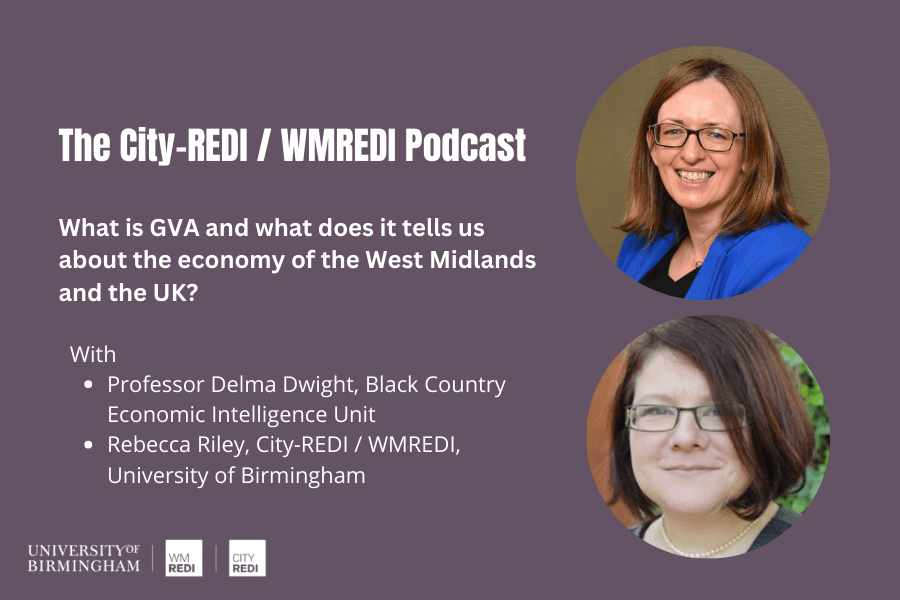Associate Professor Rebecca Riley and Professor Delma Dwight discuss GVA or Gross Value Added. What are its strengths and weaknesses as an economic measure, what does it tell us about the current state of the economy of the West Midlands and the UK and how can we improve our GVA? This podcast was inspired by the Birmingham Economic Review 2022. The annual Birmingham Economic Review is produced by City-REDI, University of Birmingham and the Greater Birmingham Chambers of Commerce. It is an in-depth exploration of the economy of England’s second city and a high-quality resource for informing research, policy and investment decisions. View and download the Birmingham Economic Review. To find out even more about Birmingham’s economy, including GVA, unemployment and CO2 emission, please visit our Birmingham Economic Review data dashboards.
The podcast covered the following topics:
What is Gross Value Added (GVA)?
There are various methods used for measuring including Gross Value Added (GVA), Gross Domestic Product (GDP) and Gross National Product (GNP). So what differentiates GVA from other measures and how do you calculate it?
For a further definition, see our blog – What is Gross Value Added (GVA)?
What are the limitations and strengths of GVA as a measure?
Working with economic data at granular, subregional and local levels is challenging. But it does allow you to understand the performance of a region and how it compares nationally or even globally. GVA is a useful measure of economic activity when used within a broader basket of indicators to give context. There are lots of things GVA doesn’t measure, like personal well-being, education, skills, and environmental impact and these are indicators that organisations are trying to get better at recording.
Clip one: Growing the West Midlands’ economy:
Why is GVA faltering in the West Midlands?
In the last few years, the region has been hit by Covid, the war in Ukraine, inflation and the energy crisis. However, there are also underlying factors that are impacting the region, like its demographics. The West Midlands has a large profile of young and old, the dependent population and that lowers labour market activity. There is also a skills deficiency in the region, with one in four people being unable to read or write. There are also decades of underinvestment in infrastructure in the region.
Clip two: What factors are holding back the economy in the West Midlands?
How can we grow GVA in the West Midlands?
Attracting investment into the region is critical, like Foreign Direct Investment (FDI). Opportunities that raise the profile of the region, like the Birmingham Commonwealth Games, can really make the region seen as a place that people want to live, work and invest in. Retaining our student population would also have an impact by increasing our working-age population and having a highly skilled labour force. Trade is also crucial for the region. Really understanding the export potential of companies would have a real impact as well.
Download a transcript of the podcast.
Disclaimer:
The views expressed in this analysis post are those of the authors and not necessarily those of City-REDI / WMREDI or the University of Birmingham.

